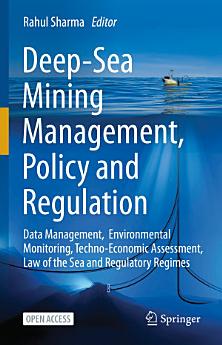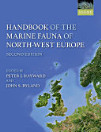Deep-Sea Mining Management, Policy and Regulation: Data Management, Environmental Monitoring, Techno-Economic Assessment, Law of the Sea and Regulatory Regimes
About this ebook
Interest in mining the seafloor deposits as potential source of critical metals has been enhanced in the current century owing to the rising population and consumer demands, as well as the fact that these minerals contain battery metals such as Co, Ni, Mn besides copper that can help transition to green energy alternatives. However, concerns over ecological impacts on marine ecosystems and those related to economic, social and cultural implications need to be addressed for ensuring sustainable mining of seabed mineral resources.
With this in view, this fifth book in the series of ‘Deep-sea Mining’, focusses on issues related to management, policy and regulation. The book is divided into the following five sections:
I – General issues on resource potential and future prospects
II – Resource and environmental data management
III – Approaches towards environmental monitoring
IV – Techno-economic considerations for commercial deep-sea mining
V – Implementation of Law of the sea and Establishment of Mining code
Chapters in this volume have been contributed by experts having decades of experience in their respective fields with an aim to provide key insights towards operationalisation of different aspects of deep-sea mining. This information is expected to serve as reference material for all stake holders including researchers, contractors, mining companies, regulators as well as NGOs involved in deep-sea mining and marine environmental conservation.
About the author
Rahul Sharma (Ph.D.), is a Consultant on Deep-sea Mining and Former Chief Scientist, National Institute of Oceanography, India, having an experience of 4 decades in the field of deep-sea minerals exploration, environmental impact assessment and economic assessment of deep-sea mining.
He has been a guest editor of 3 special issues of international journals, besides writing more than 65 papers and articles in international scientific journals as well as presenting papers at about 60 conferences around the world. He has also contributed a chapter on ‘Environmental consequences of deep-sea mining’ in the Oxford Encyclopaedia.
His assignments include Visiting Scientist to Japan, Visiting Professor to Saudi Arabia, and Member of the UNIDO mission ‘to assess the status of Deep-sea mining technologies' in Europe, USA and Japan.
Previously, he has edited 4 books in Deep-sea Mining series, viz. Deep-sea Mining (2017), Environmental issues of Deep-sea Mining (2019), Perspectives on Deep-sea Mining (2022) and Deep-sea Mining and the Water Column (2024), all published by Springer Nature.






